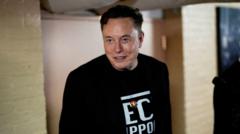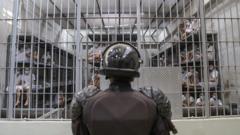In a heated exchange, Elon Musk labeled Trump trade adviser Peter Navarro a “moron” after Navarro made controversial remarks regarding Tesla's manufacturing practices, spotlighting ongoing tensions surrounding U.S. tariffs and the automotive industry.
Elon Musk Fires Back at Trump Trade Adviser Over Tesla Manufacturing Claims

Elon Musk Fires Back at Trump Trade Adviser Over Tesla Manufacturing Claims
Musk's harsh comments follow Navarro's assertion that Tesla is merely a "car assembler," igniting a Twitter feud between the two.
Elon Musk vehemently defended Tesla against comments made by Peter Navarro, President Trump’s trade adviser, who suggested that Tesla functions merely as an "assembler" due to its reliance on foreign-made components. Navarro’s remarks were made during an interview about U.S. tariff policy and emphasized a desire to see more domestically produced auto parts in the future. Musk did not hold back in his criticism of Navarro, calling him “dumber than a sack of bricks” on his social media platform X and highlighting that such claims were “demonstrably false.”
The clash unfolded after Navarro's interview on CNBC, during which he underscored the broader vision of reviving America’s manufacturing sector. "We're going to get to a place where America makes stuff again, real wages are going to be up, profits are going to be up," he remarked, referencing the U.S. auto industry’s reliance on foreign parts.
In response, Musk shared a link to a 2023 Kelley Blue Book article that pointed out Tesla's significant percentage of domestically produced parts. Musk argued, "By any definition whatsoever, Tesla is the most vertically integrated auto manufacturer in America with the highest percentage of US content." Despite this affirmation, analysts noted that Tesla does indeed source many parts internationally, particularly from China, a situation that could impact its operations if tariffs remain in place.
Elon Musk, who is also steering efforts to trim federal spending with the DOGE initiative, warned in March that tariffs could disrupt even his operation. Remarks by other industry players, like billionaire Bill Ackman, echoed concerns, recommending a hiatus on tariffs to avoid "major global economic disruption."
As the debate over U.S. tariffs continues, with Trump supporters staunchly defending the policies, Navarro's past encounters with the law—stemming from his refusal to respond to a subpoena about the January 6 investigations—add another layer of complexity to his claims.
Further developments are anticipated as market reactions unfold amid ongoing discussions surrounding the potential hazards of tariff implementation on both Tesla and the wider automotive industry.
The clash unfolded after Navarro's interview on CNBC, during which he underscored the broader vision of reviving America’s manufacturing sector. "We're going to get to a place where America makes stuff again, real wages are going to be up, profits are going to be up," he remarked, referencing the U.S. auto industry’s reliance on foreign parts.
In response, Musk shared a link to a 2023 Kelley Blue Book article that pointed out Tesla's significant percentage of domestically produced parts. Musk argued, "By any definition whatsoever, Tesla is the most vertically integrated auto manufacturer in America with the highest percentage of US content." Despite this affirmation, analysts noted that Tesla does indeed source many parts internationally, particularly from China, a situation that could impact its operations if tariffs remain in place.
Elon Musk, who is also steering efforts to trim federal spending with the DOGE initiative, warned in March that tariffs could disrupt even his operation. Remarks by other industry players, like billionaire Bill Ackman, echoed concerns, recommending a hiatus on tariffs to avoid "major global economic disruption."
As the debate over U.S. tariffs continues, with Trump supporters staunchly defending the policies, Navarro's past encounters with the law—stemming from his refusal to respond to a subpoena about the January 6 investigations—add another layer of complexity to his claims.
Further developments are anticipated as market reactions unfold amid ongoing discussions surrounding the potential hazards of tariff implementation on both Tesla and the wider automotive industry.





















